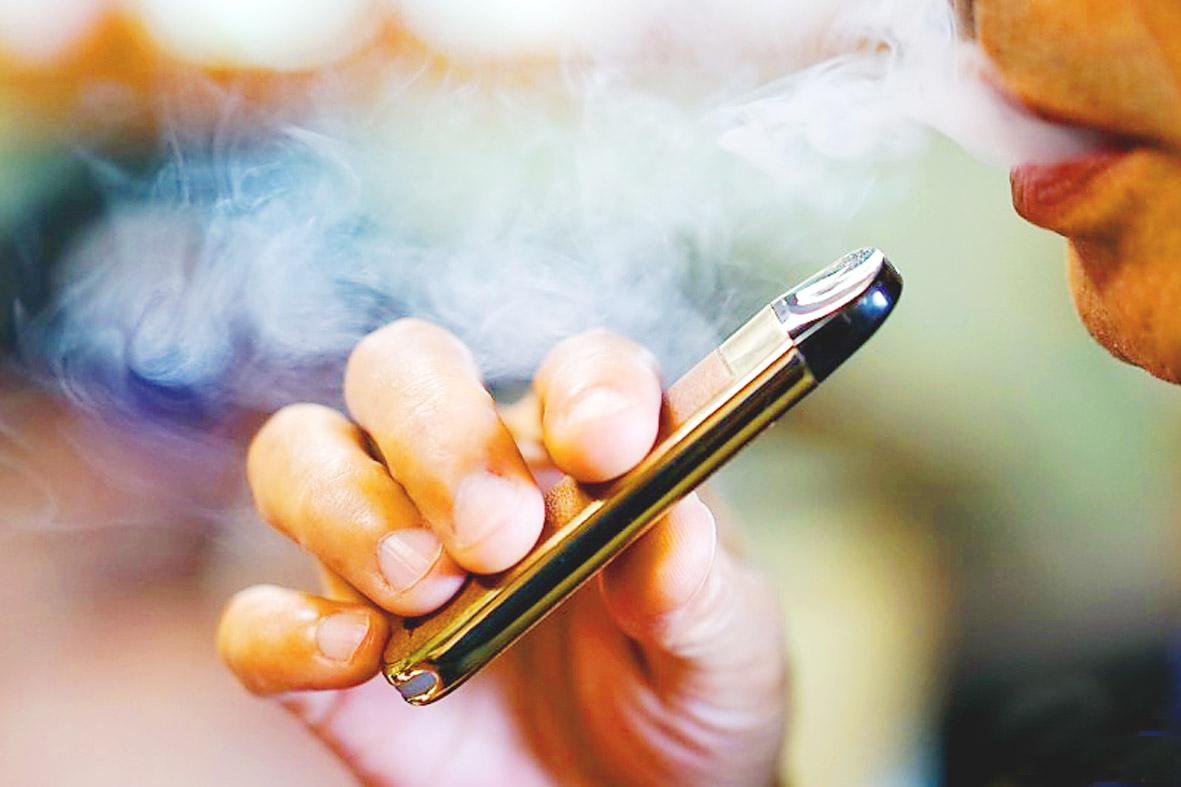Taichung is set to become the first of the nation’s six special municipalities to ban residents under the age of 18 from using or possessing e-cigarettes, starting in September.
Under the Taichung Autonomous Act for E-Cigarette Hazards Prevention (台中市電子煙危害防制自治條例) passed by the Taichung City Council on Wednesday, provision of e-cigarettes or related items to minors or pregnant women is to be punishable by a fine between NT$10,000 and N$50,000, as of Sept. 28.
Using e-cigarettes at schools, museums and movie theaters or on public transportation systems is also to be banned, with violators liable to fines ranging from NT$2,000 to NT$10,000.

Photo: Lin Ching-lun, Taipei Times
The Taichung Department of Health said a census by the Ministry of Health and Welfare found that the number of teenagers and other young people using e-cigarettes has been rising annually and poses a hazard to health.
E-cigarettes had fallen between the regulatory cracks as they are not considered a tobacco product under the terms of the Tobacco Hazard and Prevention Act (菸害防治法), the Taichung City Government said.
Department director Tseng Tzu-chan (曾梓展) said most e-cigarettes contain nicotine, and there have been cases abroad where they have contained amphetamines, marijuana, formaldehyde, acetaldehyde and other substances, which could prove to be addictive over time or cause health risks.
There have also been cases of e-cigarettes exploding, Tseng said.
The new ordinance would help reduce the use of e-cigarettes by teens and young adults, as well as protect defined areas and public spaces from vapors from such products, he said.

The manufacture of the remaining 28 M1A2T Abrams tanks Taiwan purchased from the US has recently been completed, and they are expected to be delivered within the next one to two months, a source said yesterday. The Ministry of National Defense is arranging cargo ships to transport the tanks to Taiwan as soon as possible, said the source, who is familiar with the matter. The estimated arrival time ranges from late this month to early next month, the source said. The 28 Abrams tanks make up the third and final batch of a total of 108 tanks, valued at about NT$40.5 billion

Two Taiwanese prosecutors were questioned by Chinese security personnel at their hotel during a trip to China’s Henan Province this month, the Mainland Affairs Council (MAC) said yesterday. The officers had personal information on the prosecutors, including “when they were assigned to their posts, their work locations and job titles,” MAC Deputy Minister and spokesman Liang Wen-chieh (梁文傑) said. On top of asking about their agencies and positions, the officers also questioned the prosecutors about the Cross-Strait Joint Crime-Fighting and Judicial Mutual Assistance Agreement, a pact that serves as the framework for Taiwan-China cooperation on combating crime and providing judicial assistance, Liang

A group from the Taiwanese Designers in Australia association yesterday represented Taiwan at the Midsumma Pride March in Melbourne. The march, held in the St. Kilda suburb, is the city’s largest LGBTQIA+ parade and the flagship event of the annual Midsumma Festival. It attracted more than 45,000 spectators who supported the 400 groups and 10,000 marchers that participated this year, the association said. Taiwanese Designers said they organized a team to march for Taiwan this year, joining politicians, government agencies, professionals and community organizations in showing support for LGBTQIA+ people and diverse communities. As the first country in Asia to legalize same-sex

MOTIVES QUESTIONED The PLA considers Xi’s policies toward Taiwan to be driven by personal considerations rather than military assessment, the Epoch Times reports Chinese President Xi Jinping’s (習近平) latest purge of the Chinese People’s Liberation Army (PLA) leadership might have been prompted by the military’s opposition to plans of invading Taiwan, the Epoch Times said. The Chinese military opposes waging war against Taiwan by a large consensus, putting it at odds with Xi’s vision, the Falun Gong-affiliated daily said in a report on Thursday, citing anonymous sources with insight into the PLA’s inner workings. The opposition is not the opinion of a few generals, but a widely shared view among the PLA cadre, the Epoch Times cited them as saying. “Chinese forces know full well that